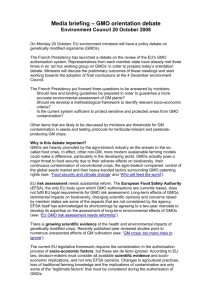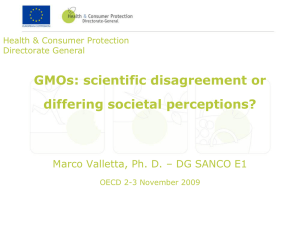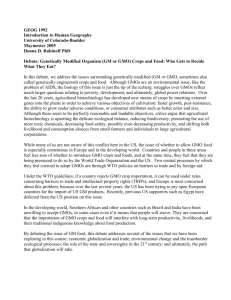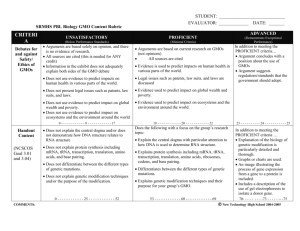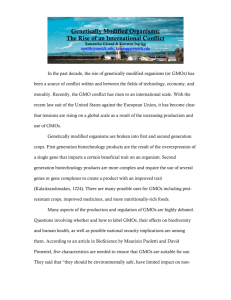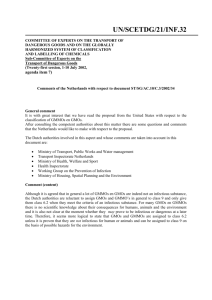Media briefing – GMO policy debate
advertisement
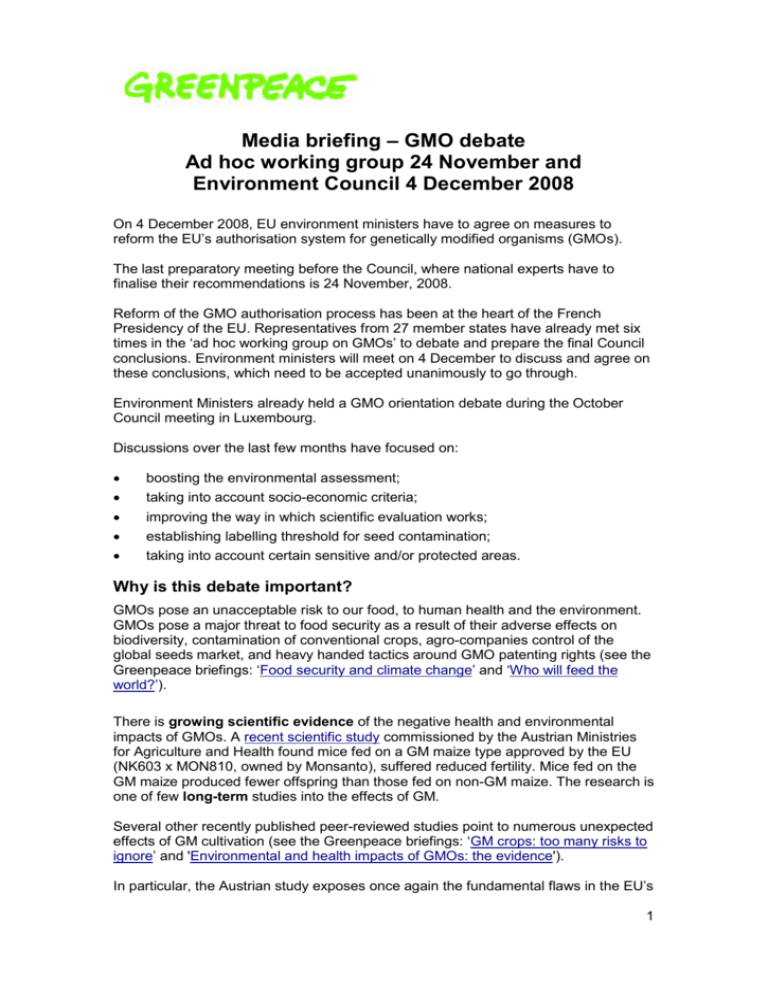
Media briefing – GMO debate Ad hoc working group 24 November and Environment Council 4 December 2008 On 4 December 2008, EU environment ministers have to agree on measures to reform the EU’s authorisation system for genetically modified organisms (GMOs). The last preparatory meeting before the Council, where national experts have to finalise their recommendations is 24 November, 2008. Reform of the GMO authorisation process has been at the heart of the French Presidency of the EU. Representatives from 27 member states have already met six times in the ‘ad hoc working group on GMOs’ to debate and prepare the final Council conclusions. Environment ministers will meet on 4 December to discuss and agree on these conclusions, which need to be accepted unanimously to go through. Environment Ministers already held a GMO orientation debate during the October Council meeting in Luxembourg. Discussions over the last few months have focused on: boosting the environmental assessment; taking into account socio-economic criteria; improving the way in which scientific evaluation works; establishing labelling threshold for seed contamination; taking into account certain sensitive and/or protected areas. Why is this debate important? GMOs pose an unacceptable risk to our food, to human health and the environment. GMOs pose a major threat to food security as a result of their adverse effects on biodiversity, contamination of conventional crops, agro-companies control of the global seeds market, and heavy handed tactics around GMO patenting rights (see the Greenpeace briefings: ‘Food security and climate change’ and ‘Who will feed the world?’). There is growing scientific evidence of the negative health and environmental impacts of GMOs. A recent scientific study commissioned by the Austrian Ministries for Agriculture and Health found mice fed on a GM maize type approved by the EU (NK603 x MON810, owned by Monsanto), suffered reduced fertility. Mice fed on the GM maize produced fewer offspring than those fed on non-GM maize. The research is one of few long-term studies into the effects of GM. Several other recently published peer-reviewed studies point to numerous unexpected effects of GM cultivation (see the Greenpeace briefings: ‘GM crops: too many risks to ignore’ and 'Environmental and health impacts of GMOs: the evidence'). In particular, the Austrian study exposes once again the fundamental flaws in the EU’s 1 risk assessment process. The authorisation system contravenes EU law which requires all available socioeconomic and scientific evidence to be considered. Currently, only the opinions of the European Food Safety Authority (EFSA) are considered. As the Austrian study highlights, EFSA is incapable of assessing the potential impacts of GMOs and therefore does not fulfil its legal and scientific requirements. EFSA’s conclusions are based exclusively on data submitted by the companies applying for licences, and have all been positive to date. Long-term effects of GMOs, effects on non-target organisms, detrimental impacts on biodiversity, diverging scientific opinions and concerns raised by member states’ competent authorities, are just some of the crucial evidence EFSA fails to consider. Changes in agricultural practices, loss of traditional farming knowledge and the implications of contamination are just some of the “legitimate factors” that must be considered during the authorisation of GMOs. Yet, so far the European Commission has ignored these, rubber stamping all of EFSA’s recommendations without question. This means the Commission is also breaching EU law. EFSA itself has acknowledged its shortcomings by agreeing to a two-year mandate to develop its expertise on the assessment of long-term environmental effects of GMOs (see the Greenpeace briefings: ‘EU GMO risk assessment needs reforming’ and 'Flaws in the EU authorisation process for GMOs’). What is the likely outcome of the meetings? The EU can play a leading role in addressing the real solutions needed to guarantee safe and secure food and agriculture in the EU, and across the world. EU member states are highly divided over GMO issues. Some countries, such as Austria, Hungary, Greece, Luxembourg, France, Italy and Cyprus, often highlight scientific concerns, the social and economic impacts of GMOs on agriculture and the inadequacy of the EU authorisation system. Others, such as the UK, Sweden and the Netherlands, strongly support the introduction of GMOs and defend business interests that clearly have no regard for science, the EU regulatory system or public opposition to GMOs. The latter group of countries has found a strong ally in José Manuel Barroso, President of the European Commission. In June Mr. Barroso set up a high level political group (the 'Sherpa group') asking the 27 EU Heads of States and Governments to nominate a person responsible for debating broader political issues concerning GMOs. The aims of such an ‘informal’ initiative are not only to bypass the Commissioners responsible for GMOs (Health Commissioner, Ms. Vassiliou and Environment Commissioner, Mr. Dimas) and steer the debate towards Barrosso’s proGMO position, but also to directly influence the ongoing French Presidency debate with environment ministers. Instead of holding open and democratic meetings, the ‘Sherpa group’ meets behind closed doors and its decisions are not made public. The only written output from the Sherpa meetings reflects the biased conclusions of the Chair (Barroso’s head of cabinet) and was not agreed by all participants. It calls on Sherpa members to intervene in the French Presidency negotiations. On 10 October the Chair invites the participants “to report the discussions of the group to their heads of government and stressed the importance of drawing their attention on ongoing discussions in the Council … in order to 2 have a richer debate.” This pressure created by the Sherpa group heightens the risk that in December’s meeting, ministers will only agree minor 'cosmetic' changes to the current authorisation system. A protracted stalemate on GMOs will show that ministers are unwilling to address food safety and security. Greenpeace demands EU decision-makers are ignoring the serious and unpredictable health and environmental risks posed by GMOs. Greenpeace calls on ministers to agree on a meaningful set of measures to reform the EU’s flawed GMO authorisation system, and calls on Barroso and the European Commission to stop blocking this urgently needed process. Greenpeace urges ministers to: Suspend the authorisation system until fundamental reform is agreed; Strengthen the GMO risk assessment process ensuring that long term environmental and health impacts are considered, as required under EU law, and put on hold EFSA’s assessments until this is the case; Reform EFSA, giving it the necessary scientific expertise to carry out complex environmental and health risk assessments (involving environmental scientists and ecologists); Ensure that the environmental and health effects caused by an increased use in herbicides in conjunction with GM crops are fully assessed, as required by EU law; Guarantee that conventional and organic seed varieties are kept free of any GMO contamination; Ensure that the negative socio-economic impacts of GM crops are taken into account during the authorisation process; Give member states and local authorities the right to establish GMO-free areas. Enact the safeguard clause and recall Monsanto’s GM maize NK603 x MON810 – as well as their mother lines MON810 and NK603 – from the European market; All briefings mentioned above are available on www.greenpeace.eu 3
